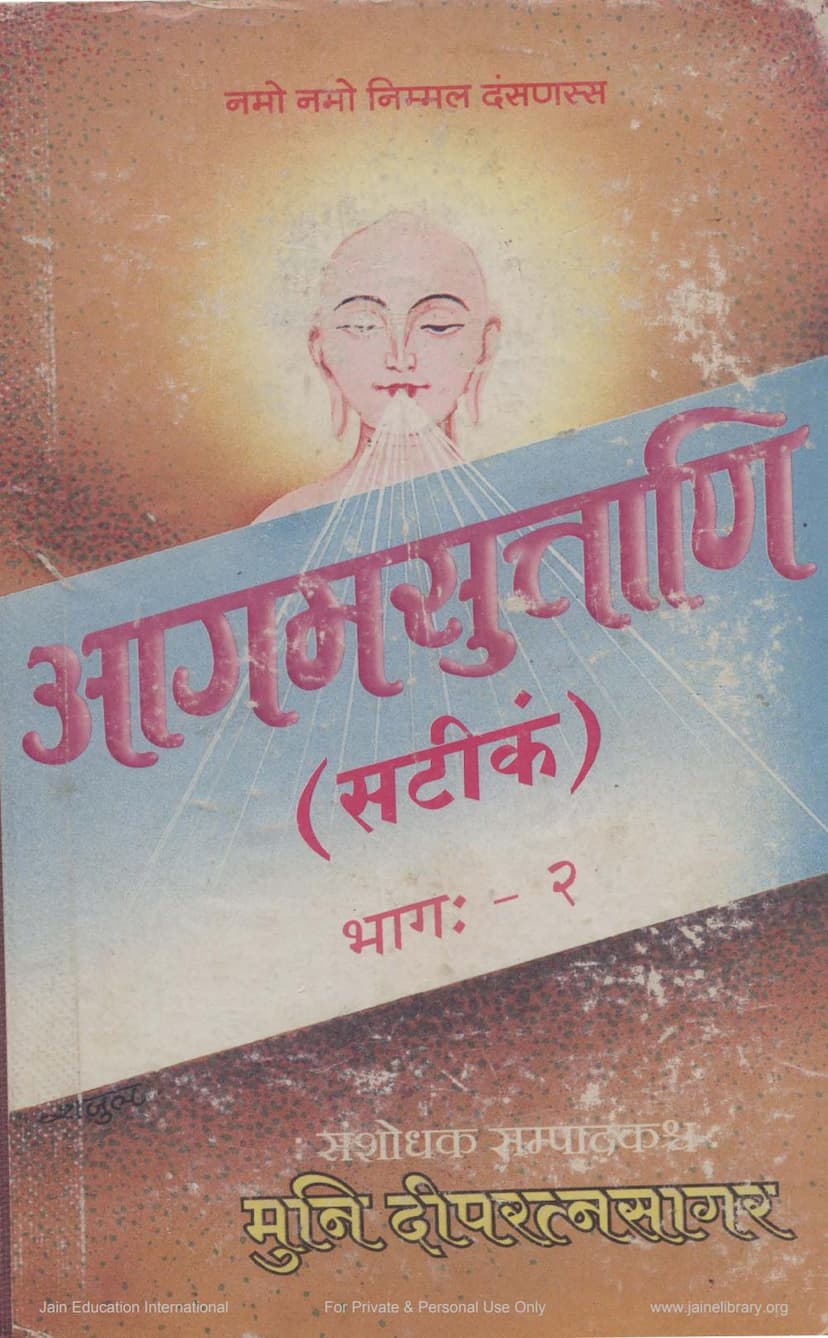Agam Suttani Satikam Part 02 Sutrakrutang
Added to library: September 1, 2025

Summary
The provided text is the second part of the Agam Suttani Satikam, specifically the Sutrakrutang Sutra, compiled and edited by Muni Deepratnasagar. This Jain text is a commentary on the Sutrakrutang, one of the Agamas of Jainism.
Here's a comprehensive summary based on the provided table of contents and the initial pages:
Book Title: Agam Suttani Satikam Part 02 Sutrakrutang Author(s): Muni Deepratnasagar, Deepratnasagar Publisher: Agam Shrut Prakashan
Overall Purpose: The Sutrakrutang is the second of the twelve Angas (limbs) of the Jain Agamas. It is known for its critical examination and refutation of various philosophical viewpoints (Vedas) prevalent during the time of Lord Mahavira, often referred to as "other-teacher" (parsamaya) doctrines. The text aims to establish the superiority and correctness of Jainism's own teachings (svasamaya) by contrasting them with these divergent views.
Structure and Content (Based on Table of Contents):
The Sutrakrutang, as presented in this volume, is divided into two main Shrutaskandhas (sections of scripture), which are further subdivided into Adhyayanas (chapters) and Uddeshakas (sections within chapters).
First Shrutaskandha: This section appears to be more extensive, covering a wide range of philosophical debates and ethical principles. It contains 16 Adhyayanas, each with multiple Uddeshakas. The topics covered in the first Shrutaskandha include:
- Time and Existence: Discussions on the nature of time, existence, and the reality of various elements.
- Philosophical Debates: Examination of theories related to:
- The five great elements (Panchamahabhutas)
- The concept of soul and its relationship with the body (Dehatma, Atmadvaita)
- The denial of causality (Akaraka, Aphalavada)
- Fatalism and determinism (Niyati)
- The origin and creator of the universe (Jagatkartrutva)
- The nature of knowledge and action (Jnanam evam Kriya-vada)
- The cycle of birth and death (Chaturgati Bhramana)
- The doctrine of everything being eternal (Lokavada)
- The doctrine of the omniscience of sages (Asarvajnavada)
- The importance of non-violence (Ahimsa)
- The rarity of obtaining enlightenment (Bodhi Durlabhatva)
- The correct path and principles of conduct (Dharma, Sanyama, Virati, Moksha Marga)
- Ethical and Practical Teachings:
- Praise of Lord Mahavira (Virastuti)
- Defining ascetic conduct (Kushil Paribhasha)
- The nature of suffering and its cessation (Upasarga, Parishaha)
- The significance of vows and discipline (Mahavrata)
- The path to liberation (Muktihetu, Tyaga, Samvara, Nirjara, Pravrajya Vidhana)
- Practices related to food and conduct (Ahar Vidhi Nishedha, Sushil definition)
- The importance of concentration and equanimity (Samadhi)
- The discourse of the Tirthankaras (Samavasarana)
Second Shrutaskandha: This section appears to be more focused on specific doctrines and teachings. It contains 7 Adhyayanas:
- Specific Doctrines:
- The story of Pundarika and its significance (Pundarika)
- The thirteen stages of action (Kriyasthana)
- The principles of understanding food and nutrition (Ahar Parigyna)
- The concept of renunciation and its importance (Pratyakhyana)
- The teachings of Jain scripture (Achar Shruta)
- The discourse on non-absolutism and non-attachment (Anekaant Vachan Prayog)
- Conversations with various ascetics and philosophers like Gosala and Ardra Kumara (Goshala evam Ardra Kumara, Shakya Bhikshu, Nalanda etc.)
Commentary (Satikam): The text is described as "Satikam," meaning it includes a commentary. Based on the initial pages and the table of contents, the commentary likely includes:
- Mulam: The original text of the Sutrakrutang.
- Niyukti: A form of commentary that provides a metrical elucidation of the original text, often in a concise verse form.
- Vritti: A more elaborate prose commentary that explains the Niyukti and the original text in detail. The text mentions "Shri Shilanka Acharya Rachit Vritti Yukta," indicating that the commentary by Acharya Shilanka is included.
Overall Theme: The Sutrakrutang, as a whole, is a foundational text in Jainism that addresses a wide spectrum of philosophical, ethical, and cosmological ideas. It serves to guide Jain monks and followers by elucidating correct principles and refuting erroneous ones, thereby leading to spiritual liberation. The inclusion of Muni Deepratnasagar's commentary provides accessibility and depth to the original scripture.